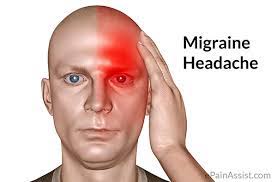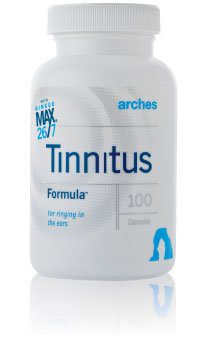By Barry Keate
Barry Keate, has lived with tinnitus over 40 years and has published 150+ research articles on numerous aspects of tinnitus. He is an expert on the condition and a well-known advocate for those with tinnitus.
Migraine headaches are experienced by about 2% of the world population. New information indicates a link between migraines and tinnitus. Individuals with migraines are also significantly more likely to experience tinnitus than the general population. Natural treatment options are effective and commonly employ magnesium. Research now shows that ginkgo biloba is also effective in reducing the frequency and intensity of migraines.
Migraine is a primary headache disorder characterized by recurrent headaches that are moderate to severe. The headaches usually affect one-half of the head, are pulsating in nature, and last from 2 to 72 hours. Associated symptoms may include nausea, vomiting, and sensitivity to light, sound, or smell. Physical activity often makes a migraine worse. Up to one-third of migraine sufferers experience an aura; typically, a short period of visual disturbance that signals that the headache will soon occur.

While migraine causes are not completely understood, older theories suggest they were due to fluctuations in blood flow to the brain. Now many researchers realize that changes in blood flow don’t initiate the pain but do contribute to it.
Today, it is widely understood that chemical compounds and hormones, such as serotonin and estrogen, play a large role in causing the pain and the sensitivity to senses for migraine sufferers. Excitable brain cells trigger these chemicals to narrow blood vessels and reduce circulation. Serotonin levels affect both sexes while fluctuating estrogen levels affect women only. This explains why women are more likely to have migraines than men. (1)
Migraine and Tinnitus Connection
A recent study in JAMA Otolaryngology, Head and Neck Surgery found that patients with a history of migraines were significantly more likely to have a cumulative incidence of cochlear disorders, especially tinnitus.
The cumulative incidence of cochlear disorders among migraine sufferers was 12.2%, higher than that of the non-migraine group, which was 5.5%. (2)
Another study among students in France found tinnitus was reported in 8.9% of students with migraine and 10.8% of students with migraine with aura, strongly suggesting a migraine and tinnitus link. (3)
Magnesium for Migraine
Magnesium is a mineral that is important for many bodily functions, including the production of protein, management of blood sugar, regulation of blood pressure, and the normal function of muscles, nerves, and the rhythm of the heart.
It is very difficult to measure magnesium in the body because less than 1% of magnesium is in the bloodstream. More than half is stored in bones with the majority of the remaining in the soft tissues. Nevertheless, it is estimated that nearly half the population is magnesium deficient with the percentage going up to 70% to 80% of those older than 70. The Recommended Daily Allowance (RDA) for men is 400 mg and for women is 300 mg.
People with kidney disease or kidney failure should not take magnesium because the kidneys no longer remove the extra magnesium.
Several medications can interact negatively with magnesium, including antibiotics, bisphosphonates, diuretics, and proton pump inhibitors. People using these medications should talk to their doctor about combining them with magnesium.
The most common side effect of taking magnesium, especially high doses, is diarrhea. Other possible side effects include dizziness, flushing, and difficulty breathing.
A magnesium deficiency has been associated with depression, interfering with the release of neurotransmitters, the aggregation of platelets, and the constriction of blood vessels. All of these processes are believed to be involved in migraine.
Several studies have found oral supplementation of magnesium may reduce the frequency and severity of migraine attacks. In one study from 1996 of 81 people with migraine who were randomly assigned magnesium or placebo, magnesium supplementation reduced the frequency of attacks by 41.6% compared with 15.8% in the placebo group. (4)
More recently, a 2008 study compared magnesium supplementation given to 30 patients compared to 10 patients given placebo. The study found that treatment with magnesium resulted in a significant decrease in migraine attack frequency and severity. (5)
Magnesium is most commonly found as magnesium oxide however this compound has very low bioavailability. Magnesium citrate has a much higher absorption by the body. Typical doses for migraine are 400 – 500 mg per day.
Ginkgo Biloba for Migraine
In a multi-center trial, ginkgolide B was evaluated in fifty women suffering from migraine with aura. (6) Ginkgolide B is one of the terpene lactones in ginkgo extract. The terpene lactones are responsible for vasodilation and increasing blood flow in the vessels that feed the brain, eyes, and ears.
The women underwent a six-month study, the first two months of which was a run-in period with no drugs administered. Following this there were two bimesters, T1 and T2, where they were given a combination of 60 mg Ginkgolide B, 11 mg CoQ-10, and 8.7 mg Vitamin B12 (riboflavin, which also helps increase blood flow), administered twice daily.
The number of migraines with aura decreased significantly during treatment. Numbers went down from an average of 3.7 during the run-in period, to 2.0 during T1, and 1.2 during T2. This represented a decrease of headache episodes of 67%.
There was also a significant decrease in the average duration, which was 40.4 minutes during run-in, to 28.2 minutes in T1, and 17.6 minutes in T2 for a decrease of 57%.
Total disappearance of migraine was observed in 11.1% of patients during T1 and in 42.2% of patients in T2. The authors concluded, “Ginkgolide B is effective in reducing migraine with aura frequency and duration. The effect is clearly evident in the first bimester of treatment and is further enhanced during the second bimester.”
Arches Tinnitus Formula with Ginkgo Max 26/7®

Ginkgo Max 26/7 is a more highly concentrated and purified ginkgo biloba extract than anything else found on the market today. It has a higher concentration of terpene lactones than the standard extract 24/6. It also has higher bilobalide content (up to 7 times that found in over-the-counter ginkgo products). This is the component most responsible for reducing tinnitus loudness and annoyance.
It is clear that ginkgo is helpful in reducing the frequency and duration of migraine and can actually cure migraine in 42% of those who have it.
If you experience migraine headaches, a combination therapy of 400-500 mg daily of magnesium citrate and Arches Tinnitus Formula with Ginkgo Max 26/7 should provide good to excellent results.
References:
1 -https://www.hopkinsmedicine.org/healthlibrary/conditions/nervous_system_disorders/How_a_migraine_happens_85,P00814
2 – Hwang JH, et al, The Association of Tinnitus and Other Cochlear Disorders with a History of Migraines, JAMA Otolaryngol Head Neck Surg. Published online July 12, 2018.
3 – Guichard E, Montagne I, et al. Association Between Headaches and Tinnitus in Young Adults: Cross Sectional Study. Headache. 2016 Jun;56(6):987-94.
4 – Peikert A, Wilimzig C, et al. Prophylaxis of migraine with oral magnesium: Results from a prospective, multi-center, placebo-controlled and double-blind randomized study. Cephalalgia. 1996;16:257-263.
5 – Koseoglu E, Talashoglu A, et al. The Effects of Magnesium prophylaxis in migraine without Aura. Mag Res. 2008;21:101-108.
6 – D’Andrea G, Bussone G. et al. Efficacy of Ginkgolide B in the Prophylaxis of Migraine with Aura. Neurol Sci. 2009 May;30 Suppl 1:S121-4.
